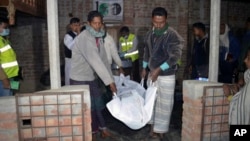A suspected suicide bomber set off his explosives during Friday prayers at a mosque in northern Bangladesh, killing himself and leaving about a dozen people injured.
The bombing took place at the house of worship run by the minority Ahmadiyya Muslim community in Bagmara, a town about 250 kilometers northwest of Dhaka, investigators said. No one claimed responsibility for the attack at the Syedpur Chakpara Ahmadiyya Jame Masjid mosque.
“Our primary investigation reveals that the man who died there was carrying the bomb. Noticing the pattern of injury marks on his body, it appears that he was on a suicide mission,” Motiar Rahman, the officer in charge of the local police station in Bagmara, told reporters. He said three of the injured worshippers, including a 12-year-old boy, were taken to a hospital.
Abdus Samad, secretary of Ahmadiyya Muslim Jama'at Bangladesh, a national body representing the country’s 100,000 Ahmadis, said the bomber was accompanied by a second attacker who escaped in the ensuing chaos.
“By speaking to the worshippers on the spot and the investigating police officials, we have come to know that the two attackers entered the mosque in the guise of worshippers," Samad told VOA. "The IED [improvised explosive device] exploded when the two men were sitting in the row along with other worshippers and they all were prostrated during the prayer.”
He said police told him the dead bomber's jacket contained additional explosive devices that had failed to detonate. “Several dozen worshippers would have surely died today if the attackers managed to carry out their terror operation the way they had engineered,” Samad said.
Islamist militancy rising
About 96 percent of Bangladesh’s 149 million Muslims are Sunni, and the rest are Shi’ites and Ahmadiyyas.
Friday’s explosion at the Ahmadiyya mosque came amid concerns about rising Islamist violence targeting non-Sunni sects and non-Muslims.
In October, a bomb attack on a Shi’ite religious procession killed two people in Dhaka. Last month, unidentified gunmen killed the muezzin of a Shi’ite mosque in Bogra. Earlier this month, bombs hurled by militants injured 10 devotees at a Hindu temple in the Dinajpur district.
More than three dozen church leaders have received death threats from Islamist militants in recent weeks. Four Christian leaders have narrowly escaped attempts on their lives.
The Islamic State terror group as well as the banned local militant outfit Jama'atul Mujahideen Bangladesh, known as JMB, claimed responsibility for the attacks and threats, even as Bangladeshi authorities denied IS has a foothold in the country.
Police recently arrested more than a dozen JMB militants who authorities said had been involved in recent gun and bomb attacks.
Raid on hideout
In a 15-hour crackdown on Thursday, security forces recovered a suicide vest and 16 grenades from a JMB hideout, along with enough materials to make more than 200 IEDs, said authorities, who issued security alerts for all religious minority groups in the country.
“The existence of the suicide vest in the possession of the terrorist outfit gives an indication that they are preparing for attaining a capacity to inflict heavier casualties in their attacks. It seems we are not very far from witnessing suicide attacks in Bangladesh,” retired Major General Mohammad Abdur Rashid, a security analyst, said in an interview with VOA.
When the churches were brought under security cover, the militants chose the remote, unguarded Ahmadiyya mosque as their target, said Rashid, who noted that since many church leaders have been threatened, security for all churches, including 60 in Dhaka, has increased, with the use of surveillance cameras and deployment of additional police officers.
Ahmadiyya leader Samad said the militants appear to have spread their network across the country.
“We shall extend security to all of the country’s 150 Ahmadiyya mosques now," he said. "In the name of Islam, the militants are indulging violence. What they are doing is totally un-Islamic.”
Several Muslim religious groups in Bangladesh have campaigned for years against the Ahmadiyya Muslims. They identify Ahmadiyyas as non-Muslims and have sought a ban on all Ahmadiyya religious practices in the country.




